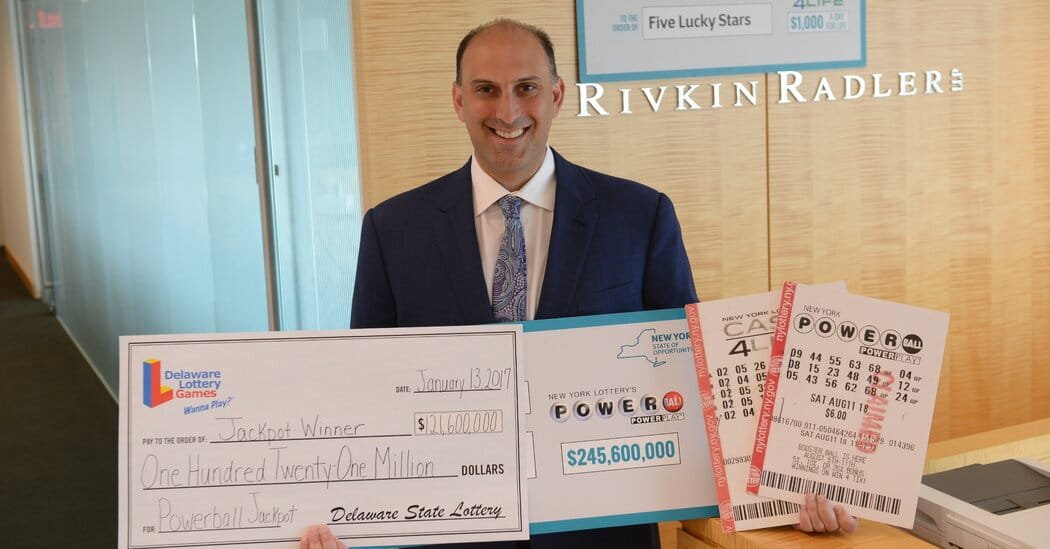He called himself the “Lottery Lawyer,” developing a national reputation for helping high-profile lottery winners with their investments.
He promised to secure their wealth for generations and to protect them from scam artists.
But on Tuesday, federal prosecutors in Brooklyn accused the lawyer, Jason M. Kurland, of working with a mob associate to steal millions of dollars from his clients.
Mr. Kurland, 46, was arrested on Tuesday morning at his home on Long Island alongside three other men — including Christopher Chierchio, 52, who prosecutors said was a reputed soldier for the Genovese crime family.
As part of the scheme, Mr. Kurland tricked three lottery winners who had hired him into putting $107 million into various investments, prosecutors said. The lottery winners lost a total of more than $80 million.
One of them was the winner of last year’s $1.5 billion Mega Millions jackpot in South Carolina.
After persuading the lottery winners to invest, the four men then spent some of the funds on golf club memberships, yachts, private jets, a Porsche and other luxury cars and shopping sprees at stores like Fendi, prosecutors said.
“Lottery winners can’t believe their luck when they win millions of dollars, and the men we arrested this morning allegedly used that euphoric feeling to their advantage,” said William F. Sweeney Jr., head of the F.BI.’s New York office.
Mr. Kurland and his alleged co-conspirators face several counts of fraud, money laundering and conspiracy. They each pleaded not guilty at their arraignments on Tuesday.
A lawyer for Mr. Kurland declined to comment. A lawyer for Mr. Chierchio said his client was not affiliated with the mafia and expected to be cleared of the charges.
Law enforcement officials had been wiretapping the men’s phone calls for months, including conversations in which they discussed whether they might go to jail.
The lottery winners paid between $75,000 and $200,000 in upfront payments to hire Mr. Kurland and his law firm, according to court papers. Mr. Kurland then charged monthly fees of between $15,000 and $50,000.
A spokeswoman for Rivkin Radler, the law firm where Mr. Kurland has worked since 2018, said the firm was cooperating with the authorities and planned to remove him as a partner.
In a 2016 interview with Vice, Mr. Kurland discussed the prevalence of scams targeting lottery winners. “A lot of these winners are not sophisticated enough to see it,” he said, “so you really have to rely on the professionals.”
On Mr. Kurland’s Twitter account, he often urged lottery winners around the country to hire him, using hashtags like #callme. In previous interviews, he said he has represented lottery winners since 2011, specializing in navigating the laws around real estate and trusts.
Behind the scenes, prosecutors said, Mr. Kurland was getting kickbacks for steering lottery winners to invest in business deals controlled by Mr. Chierchio and the two other defendants, Frangesco Russo, 38, and Francis Smookler, 45.
Some of the deals involved companies that sold personal protective equipment during the coronavirus pandemic to the state of California and to the New York Police Department, court papers showed.
During a phone call last month that was intercepted by law enforcement, Mr. Kurland told an associate that the growing coronavirus outbreak in Florida would bode well for business. “The worse it is the better,” he said, according to prosecutors.
The men directed some of the lottery winners’ money to a jeweler named Gregory Altieri, who had promised sky-high returns to his investors. Last month, federal prosecutors in Brooklyn accused him of defrauding his investors in a $200 million Ponzi scheme.
Earlier this year, when Mr. Altieri failed to repay a loan, Mr. Russo and Mr. Smookler threatened to torture him and shoot his family, prosecutors said.
Mr. Russo’s father was a Colombo crime family captain who died while serving a life sentence in prison for murder, and he mentioned his father while threatening Mr. Altieri, prosecutors said.
A lawyer for Mr. Russo did not respond to a request for comment. Mr. Smookler’s lawyer had no immediate comment.
Law enforcement officials are seeking to recover any stolen funds by seizing 13 bank accounts associated with the scheme, which had been going on since at least 2018.
In one instance, Mr. Kurland transferred $19.5 million out of a client’s account without the client’s permission and funneled much of it to Mr. Chierchio, prosecutors said.
In 2004, Mr. Chierchio pleaded guilty in a state case in Brooklyn to falsifying business records. Last year, he was acquitted at trial on bid-rigging charges.
Prosecutors said Mr. Chierchio lived in a $11,000-a-month luxury building in Manhattan and purports to run a plumbing business.
In a call last month that was intercepted by law enforcement, Mr. Chierchio brushed off an associate’s concerns about a federal investigation into the lottery scheme, saying he had been pursued by the authorities his entire life.
“So bring the F.B.I. Who cares?” Mr. Chierchio said, according to prosecutors. “It doesn’t matter. I laugh at them. OK? I laugh at them.”
In phone calls, Mr. Kurland discussed with his associates how to cover up the scheme, worried they were “playing with fire,” according to court papers. The men wondered if giving the money back to the lottery winners would thwart the investigation or if they could make the theft look like legitimate business transactions, prosecutors said.
At one point, according to court papers, Mr. Smookler and Mr. Russo predicted that they might face fraud charges; Mr. Smookler said on a phone call that he hoped to merely face a fine and not go to jail.
“We are in a little bit of a pickle,” he said.





